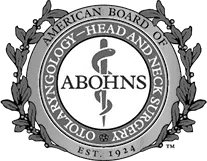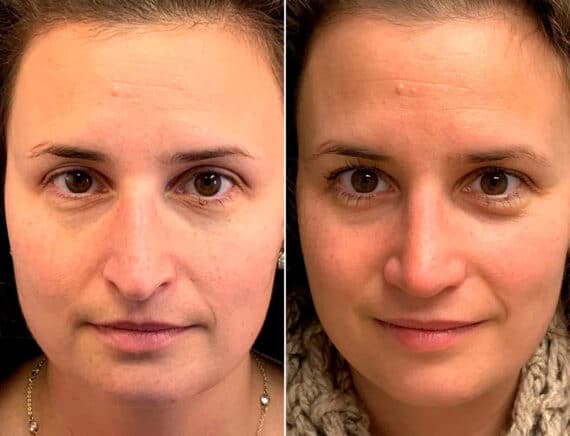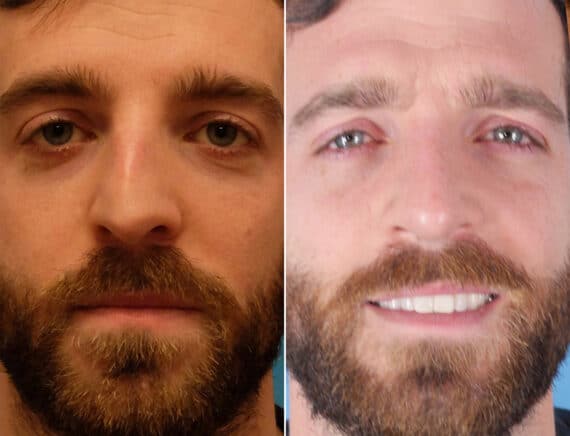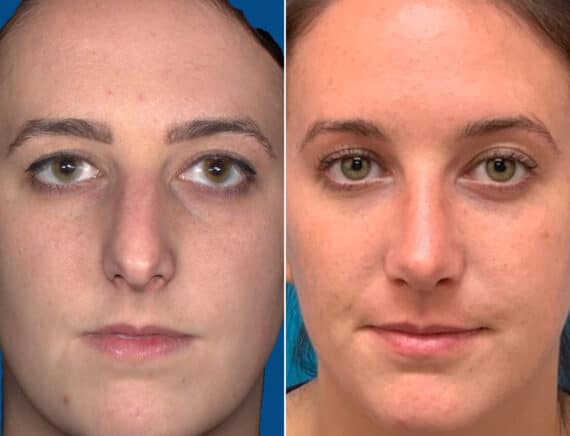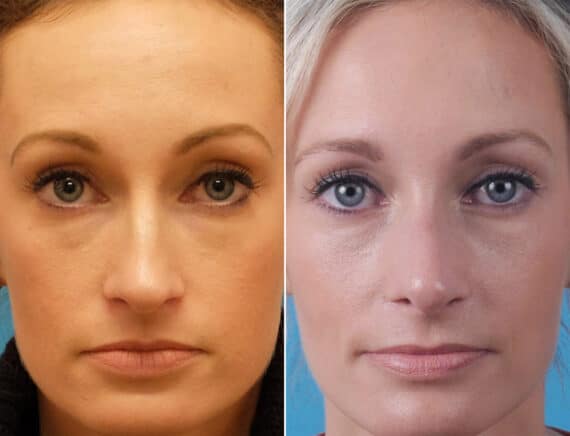Experience the Powerful Benefits of Rhinoplasty
The art of rhinoplasty goes beyond mere aesthetics; it’s a transformative journey to harmonized facial symmetry and boosted self-esteem. Tapping into this surgical marvel offers a blend of functional enhancements and appearance refinements, promising a renewed sense of confidence.
What is Primary Rhinoplasty Surgery?
Primary rhinoplasty surgery is a transformative procedure designed specifically for first-time patients seeking to improve the aesthetic appearance or functionality of their noses. Unlike revision rhinoplasty, which corrects previous surgeries, primary rhinoplasty offers a fresh opportunity to enhance facial harmony and balance.
This procedure is ideal for individuals looking to address concerns such as nasal shape, size, or structural issues that affect breathing. At Becker Plastic Surgery, we understand the unique needs of first-time rhinoplasty patients. Our approach is tailored to ensure that each individual receives personalized care, ensuring results that beautifully complement their natural features while achieving their desired outcome.
Approaches to Rhinoplasty: Cosmetic and Functional
Cosmetic Rhinoplasty
Cosmetic rhinoplasty is an outpatient nose surgery procedure that can alter the physical appearance of the nose in order to achieve certain aesthetic goals. This type of cosmetic rhinoplasty is often done by experienced surgeons, and it involves reshaping the soft tissue, cartilage, bone, or other internal structures of the nose in order to create a more pleasing nasal shape. Common reasons for cosmetic nasal surgery include improving the proportions of the nose, correcting any asymmetries in its shape or size, and refining features such as the nostrils and nasal tip, nasal bridge, or a crooked nose. The goal is to create an aesthetically pleasing “perfect” nose that complements one’s face and harmonizes with their other facial features.
Functional Rhinoplasty
Functional rhinoplasty is a type of nose surgery that focuses on improving breathing ability and treating certain medical conditions that affect nasal function. It may be performed by a facial plastic surgeon to address structural issues inside the nose such as deviated nasal septums, enlarged turbinates, or other structural abnormalities that cause difficulty breathing through one or both nostrils. During this complex procedure, cartilage grafts from other parts of the body may be used to help rebuild internal nasal structures in order to correct these functional issues. The ultimate goal is to improve breathing ability while still maintaining aesthetic balance with one’s facial features.
Rhinoplasty Results on Philadelphia Patients
Hundreds of satisfied patients
* All patients are unique and individual results may vary.
Types of Rhinoplasty we offer in Philadelphia
Open Rhinoplasty
Open rhinoplasty is a surgical technique where the surgeon makes an incision across the columella (the strip of tissue between the nostrils). This method provides full access to the underlying nasal structure, allowing the surgeon to precisely reshape and reposition cartilage, bone, and other tissues. Because of this comprehensive access, open rhinoplasty is typically used for more complex cases, such as correcting a nasal bump, major structural changes, or significant alterations to the shape of the nose.
- Advantages: Greater visibility and control over the nasal structure, making it easier to address complicated concerns or perform major adjustments.
- Considerations: The procedure may take longer, and the recovery might involve more nasal congestion or swelling due to the more invasive nature of the approach.
Open rhinoplasty is often chosen for patients requiring extensive changes, and it is crucial to select an experienced board-certified plastic surgeon to ensure optimal outcomes with minimal complications.
Closed Rhinoplasty
In closed rhinoplasty, the surgeon makes small incisions inside the nostrils, avoiding any external incisions. This closed approach provides access to the internal nasal structure while maintaining a quicker recovery time and less visible scarring. However, it may be less suitable for patients requiring significant structural modifications, such as reshaping large amounts of cartilage or correcting a nasal bump.
- Advantages: Minimal scarring, shorter downtime, and reduced post-operative nasal congestion.
- Considerations: This rhinoplasty technique may not offer the same level of precision as open rhinoplasty for extensive revisions or complex reshaping.
Patients with minor cosmetic concerns, such as adjusting the tip or refining small asymmetries, often benefit from this approach. As with any nose surgery procedure, working with a skilled board-certified rhinoplasty specialist is key to achieving the desired results.
Nose Tip Rhinoplasty
Nose Tip Rhinoplasty focuses specifically on reshaping the tip of the nose, often to enhance symmetry, improve projection, or refine the overall shape. This procedure can be performed using either open or closed rhinoplasty, depending on the complexity of the desired changes. Patients who seek to refine or balance their nasal tip without altering other parts of the nose are ideal candidates for this procedure.
- Advantages: Limited to the nasal tip, offering a more straightforward recovery. Suitable for minor adjustments that can have a big impact on facial harmony.
- Considerations: Less invasive than full rhinoplasty but still requires skill and precision to ensure a balanced, natural-looking outcome.
Septorhinoplasty
Septorhinoplasty is a specialized procedure that combines cosmetic changes with functional improvements, particularly addressing the septal cartilage. This type of surgery is ideal for patients who have breathing problems due to a deviated septum or structural issues in the nose while also seeking cosmetic improvements. The procedure corrects both nasal function and appearance.
- Advantages: Combines both aesthetic and functional improvements, often improving breathing while enhancing the look of the nose.
- Considerations: This can involve a longer recovery due to the combination of functional and cosmetic adjustments.
Patients suffering from nasal obstruction or difficulty breathing due to a deviated septum can benefit from septorhinoplasty as it corrects these functional issues while also improving the external appearance of the nose.
Ethnic Rhinoplasty
Ethnic Rhinoplasty is a procedure designed to refine the nose while preserving the natural features that reflect your cultural background. This approach is ideal for patients of African, Asian, Middle Eastern, Latino, or other diverse heritages who want to enhance their nose without losing the unique characteristics that define their appearance. The goal is to improve balance and shape while keeping the results authentic and true to you.
Advantages: This technique focuses on subtle, natural improvements that blend beautifully with your facial features. It allows patients to enhance their nose while maintaining the traits that make them unique.
Considerations: Every ethnicity has different nasal structures and skin types, so it’s important to work with a surgeon experienced in ethnic rhinoplasty to ensure results that look natural and harmonious with your face.

Patient Reviews
Ideal Candidates for Rhinoplasty Surgery
At Becker Plastic Surgery, we ensure that each patient is carefully evaluated to determine if they are an ideal candidate for rhinoplasty. This cosmetic procedure can be life-changing, but it is crucial that patients meet specific criteria to ensure both safety and optimal results.

Ideal candidates for rhinoplasty include:
- Healthy individuals: Candidates must be in good general health, both physically and emotionally, to undergo surgery and handle the recovery process.
- Those with realistic expectations: It’s important that patients understand both the possibilities and limitations of rhinoplasty. Emotional maturity is necessary to cope with the changes and to be satisfied with the outcome.
- Patients who have sufficient skin elasticity and a healthy nasal structure: These factors are crucial for ensuring natural-looking results after reshaping.
- Individuals whose nasal growth is complete: Typically, candidates should be at least in their late teens, ensuring that the nose is fully developed before undergoing surgery.
- People dissatisfied with the size, shape, or symmetry of their nose: Rhinoplasty is ideal for patients looking to enhance their facial balance by addressing cosmetic concerns or correcting functional issues like a deviated septum or breathing problems.
Rhinoplasty Consultation and Surgical Process: What to Expect
Before undergoing nasal surgery, it’s essential to have a detailed consultation with your board-certified plastic surgeon to discuss your medical history, cosmetic concerns, and cosmetic goals. The consultation helps ensure the rhinoplasty procedure is tailored to your needs.
Consultation Overview:
- Discussion of medical history: Your surgeon will evaluate any health conditions that could affect the surgery or recovery process.
- Cosmetic concerns and goals: You’ll outline your aesthetic desires and functional needs (if applicable), such as improving the nose shape or correcting structural issues.
- Surgical plan: Based on your facial features and goals, your surgeon will recommend a personalized treatment plan, explaining potential risks and complications.
Rhinoplasty Procedure:
The exact steps of a rhinoplasty procedure may vary depending on whether it’s for cosmetic or functional purposes, but common elements include:
- Reshaping tissue, cartilage, and nasal bone: These are adjusted to create the desired nose shape.
- Use of grafts: If necessary, grafts from nasal cartilage or rib cartilage may be used to rebuild areas affected by structural issues.
- Injectable fillers: In some cases, dermal fillers may be used to add volume or refine the nose’s shape without surgery.
Post-Surgery Considerations:
- Risks and complications: While nose surgery is generally safe, your surgeon will discuss possible complications and how to minimize them.
- Recovery process: You’ll receive detailed instructions on post-operative care to ensure a smooth recovery.
Ultimately, selecting a board-certified plastic surgeon with the experience to understand your unique needs is crucial for achieving optimal results with minimal complications.
Rhinoplasty Recovery Timeline:
What to Expect After Your Procedure
Recovering from a rhinoplasty procedure is a gradual process, and understanding each stage can help you plan for a smooth and successful outcome. At Becker Plastic Surgery, we provide comprehensive post-op care instructions to help our rhinoplasty patients recover comfortably and achieve the best possible results. Below is a detailed timeline to guide you through the recovery process, with tips for each stage.
Day 1-3: Immediate Post-Surgery
Swelling, bruising, and slight discomfort are normal days after surgery. Some patients also experience dizziness or vertigo. Pain medications may be prescribed to manage discomfort and reduce inflammation.
Tips
- Keep your head elevated to reduce swelling.
- Use cold compresses around the eyes and nose to minimize bruising.
- Follow your surgeon’s instructions regarding medications and avoid any physical activities during these early days to protect your healing nose.
- Avoid touching or blowing your nose to prevent any breathing issues.
Day 1-3
Day 4-7: The First Week
Swelling and bruising may peak during the first week but will begin to subside. The splint placed during the surgery will still be in place to protect your nose. Avoid all strenuous activities during this time.
Tips
- Continue to rest and avoid physical activities that could impact your nose.
- Attend your follow-up appointment where your splint may be removed, and the healing progress will be assessed.
- Continue using pain medications if necessary and avoid anything that could put pressure on the nose.
Day 4-7
Week 2-4: Subtle Healing
By the weeks after surgery, the swelling should begin to subside noticeably, but your nose will still be tender. Most rhinoplasty patients can return to light daily activities, though the nose will still be fragile.
Tips
- Avoid wearing glasses that rest on the nose, as this could affect the healing process.
- You may return to work or light activities, but avoid bending or heavy lifting.
- Continue to avoid any strenuous activities or anything that could affect the reshaping process.
Week 2-4
Week 5-6: Recovery Progress
Swelling should have significantly reduced, and the shape of your nose will start to become more defined. However, care should still be taken to avoid accidental injury.
Tips
- You can slowly resume mild physical activities like stretching or walking, but contact sports should still be avoided.
- Protect your nose from any potential impacts to allow it to settle into its perfect nose shape.
Week 5-6
Month 3-6: Long-Term Recovery
By the months after surgery, the majority of swelling should have resolved, and your nose will take on its final shape. Some subtle swelling may persist at the tip, but the overall form should be visible.
Tips
- You may resume normal activities, but always protect your nose during any high-impact or strenuous activities.
- Continue to follow your surgeon’s care instructions to maintain the shape and health of your nose.
Month 3-6
Month 12: Final Results
After a year, your nose will have fully healed, and the final result of your rhinoplasty procedure will be evident. The nose should look natural, and all swelling will disappear, revealing a perfect nose that complements your facial features.
Month 12
Unique Aspects of Primary Rhinoplasty Compared to Revision Rhinoplasty Procedures
| Rhinoplasty | Revision Rhinoplasty | |
|---|---|---|
| Aspect | It can be more difficult due to the presence of scar tissue, changes in the nasal structure, and limitations from previous surgeries. | Corrects or modifies results from a previous rhinoplasty; addresses aesthetic or functional issues. |
| Purpose | Aims to reshape or resize the nose to enhance facial aesthetics or improve nasal function. | Corrects or modifies results from a previous rhinoplasty, addressing aesthetic or functional issues. |
| Nasal Structure | Surgeons work with the original nasal structure, which is intact and untouched by previous surgeries. | Involves working with altered anatomy due to prior surgery, often presenting complexities with scar tissue and reshaping. |
| Aesthetic Goals | Allows for more straightforward planning and execution to align with the patient’s original aesthetic goals. | Adjustments are often made to improve or fix the results of a previous surgery, sometimes requiring compromises in aesthetics. |
| Challenges | Typically presents fewer challenges as the nasal tissue is fresh, making reshaping more predictable. | The presence of scar tissue can limit options for reshaping and requires delicate handling by the surgeon. |
| Recovery | Recovery is generally more straightforward as there is no prior surgical interference or scar tissue to consider. | Recovery can be more complex and prolonged due to the need to navigate scar tissue and potentially unpredictable healing. |
| Surgical Precision | Surgeons have more flexibility in achieving a balanced and natural-looking result due to the untouched tissue. | Surgeons must carefully plan around previous alterations, which can limit the degree of changes that can be made. |
| Suitability | Best suited for first-time patients seeking to address cosmetic or functional issues with a natural appearance. | Ideal for patients who are dissatisfied with the results of their first surgery or have unresolved functional problems. |
| Scar Tissue | No scar tissue is present, allowing for cleaner and more precise adjustments to the nose. | Presence of scar tissue can limit options for reshaping and requires delicate handling by the surgeon. |
| Surgeon Expertise | Requires high-level skill in planning and achieving natural facial harmony in a first surgery. | Demands advanced expertise to work with altered structures and correct complications from previous procedures. |
Rhinoplasty Cost in Philadelphia & New Jersey
The cost of rhinoplasty in Philadelphia & New Jersey can vary greatly depending on the complexity of the procedure, the patient’s individual needs, and whether any additional procedures are necessary. Generally speaking, traditional rhinoplasty is a relatively affordable procedure that may be covered by some health insurance plans depending on the case. Patients should consult with their plastic surgeons to discuss financial options such as financing plans so that they can receive their desired results without breaking the bank. We also recommend researching different board-certified plastic surgeons in order to find one who offers competitive rates for rhinoplasty procedures in both Philadelphia & New Jersey.
Why choose the Rhinoplasty Surgeons at Becker Plastic Surgery

Pick one of our 6 convenient locations
for Your Plastic Surgery Needs

